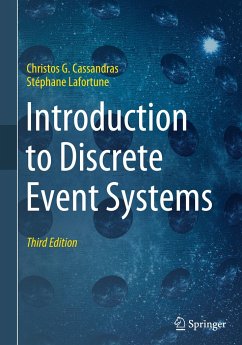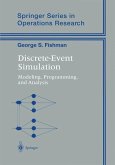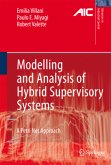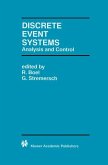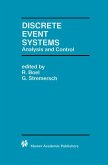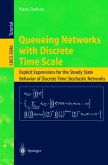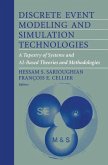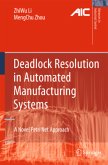This unique textbook comprehensively introduces the field of discrete event systems, offering a breadth of coverage that makes the material accessible to readers of varied backgrounds. The book emphasizes a unified modeling framework that transcends specific application areas, linking the following topics in a coherent manner: language and automata theory, supervisory control, Petri net theory, Markov chains and queueing theory, discrete-event simulation, and concurrent estimation techniques.
Topics and features:
detailed treatment of automata and language theory in the context of discrete event systems, including application to state estimation and diagnosiscomprehensive coverage of centralized and decentralized supervisory control of partially-observed systemstimed models, including timed automata and hybrid automatastochastic models for discrete event systems and controlled Markov chainsdiscrete event simulationan introduction to stochastic hybrid systemssensitivity analysis and optimization of discrete event and hybrid systemsnew in the third edition: opacity properties, enhanced coverage of supervisory control, overview of latest software tools
This proven textbook is essential to advanced-level students and researchers in a variety of disciplines where the study of discrete event systems is relevant: control, communications, computer engineering, computer science, manufacturing engineering, transportation networks, operations research, and industrial engineering.
Christos G. Cassandras is Distinguished Professor of Engineering, Professor of Systems Engineering, and Professor of Electrical and Computer Engineering at Boston University.
Stéphane Lafortune is Professor of Electrical Engineering and Computer Science at the University of Michigan, Ann Arbor.
Topics and features:
detailed treatment of automata and language theory in the context of discrete event systems, including application to state estimation and diagnosiscomprehensive coverage of centralized and decentralized supervisory control of partially-observed systemstimed models, including timed automata and hybrid automatastochastic models for discrete event systems and controlled Markov chainsdiscrete event simulationan introduction to stochastic hybrid systemssensitivity analysis and optimization of discrete event and hybrid systemsnew in the third edition: opacity properties, enhanced coverage of supervisory control, overview of latest software tools
This proven textbook is essential to advanced-level students and researchers in a variety of disciplines where the study of discrete event systems is relevant: control, communications, computer engineering, computer science, manufacturing engineering, transportation networks, operations research, and industrial engineering.
Christos G. Cassandras is Distinguished Professor of Engineering, Professor of Systems Engineering, and Professor of Electrical and Computer Engineering at Boston University.
Stéphane Lafortune is Professor of Electrical Engineering and Computer Science at the University of Michigan, Ann Arbor.
From the reviews of the second edition:
"This largely self-contained and extremely accessible textbook presents a unified treatment of DES essentially centred on automata and proceeds with a gradual increase in complexity by covering untimed, timed, and stochastic timed models. ... suitable for senior undergraduate or junior graduate level clientele, this textbook maintains the same format with a profusion of exercises and a good set of references at the end of each chapter, making it extremely useful for supporting coursework." (Fernando Lobo Pereira, Mathematical Reviews, Issue 2009 f)
"This book is an introduction to discrete event systems that emphasizes modeling and control issues. ... Several references and a Web site devoted to the book increase its value and usability. The book is well written and maintains a good balance of breadth and depth. It is highly suitable as a textbook, featuring various examples that make it easy to follow and understand the topics. It is already used in several universities around the world." (G. Ciobanu, ACM Computing Reviews, October, 2009)
"This textbook is a comprehensive introduction to the field of discrete event systems, emphasizing breadth of coverage and accessibility of the material to a large audience of readers with different backgrounds. Its key feature is the emphasis placed on a unified modeling framework for the different facets of the study of discrete event systems." (Tiit Riismaa, Zentralblatt MATH, Vol. 1165, 2009)
"A textbook for advanced-level students ... and as a reference for researchers in the areas of control, communications, computer engineering, computer science, manufacturing engineering, operations research, and industrial engineering. ... We consider Introduction to Discrete Event Systems among the best books that are excellent for both instructional and research purposes. ... the book still enjoys its status as one of a kind in the field of discrete event systemsbecause of its quality, scope, utility, timeliness, and a wealth of important coherent topics." (Andrea Paoli and N. Eva Wu, IEEE Control Systems Magazine, Vol. 29, June, 2009)
"Like the first edition, this edition provides a broad introduction to the field of discrete event systems. The book combines easy-to-read concepts and methods of such topics as language and automata theory, supervisory control. ... This second edition is thoroughly and carefully revised and expanded. ... The book is clearly written and well organized. ... It will benefit both undergraduate and graduate students ... . this book will be useful for researchers in a host of disciplines related to the study of discrete event systems." (Technometrics, Vol. 51 (1), February, 2009)
"This largely self-contained and extremely accessible textbook presents a unified treatment of DES essentially centred on automata and proceeds with a gradual increase in complexity by covering untimed, timed, and stochastic timed models. ... suitable for senior undergraduate or junior graduate level clientele, this textbook maintains the same format with a profusion of exercises and a good set of references at the end of each chapter, making it extremely useful for supporting coursework." (Fernando Lobo Pereira, Mathematical Reviews, Issue 2009 f)
"This book is an introduction to discrete event systems that emphasizes modeling and control issues. ... Several references and a Web site devoted to the book increase its value and usability. The book is well written and maintains a good balance of breadth and depth. It is highly suitable as a textbook, featuring various examples that make it easy to follow and understand the topics. It is already used in several universities around the world." (G. Ciobanu, ACM Computing Reviews, October, 2009)
"This textbook is a comprehensive introduction to the field of discrete event systems, emphasizing breadth of coverage and accessibility of the material to a large audience of readers with different backgrounds. Its key feature is the emphasis placed on a unified modeling framework for the different facets of the study of discrete event systems." (Tiit Riismaa, Zentralblatt MATH, Vol. 1165, 2009)
"A textbook for advanced-level students ... and as a reference for researchers in the areas of control, communications, computer engineering, computer science, manufacturing engineering, operations research, and industrial engineering. ... We consider Introduction to Discrete Event Systems among the best books that are excellent for both instructional and research purposes. ... the book still enjoys its status as one of a kind in the field of discrete event systemsbecause of its quality, scope, utility, timeliness, and a wealth of important coherent topics." (Andrea Paoli and N. Eva Wu, IEEE Control Systems Magazine, Vol. 29, June, 2009)
"Like the first edition, this edition provides a broad introduction to the field of discrete event systems. The book combines easy-to-read concepts and methods of such topics as language and automata theory, supervisory control. ... This second edition is thoroughly and carefully revised and expanded. ... The book is clearly written and well organized. ... It will benefit both undergraduate and graduate students ... . this book will be useful for researchers in a host of disciplines related to the study of discrete event systems." (Technometrics, Vol. 51 (1), February, 2009)

